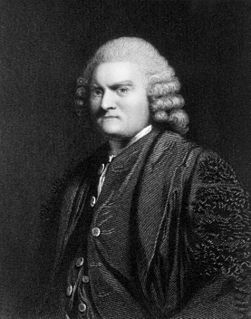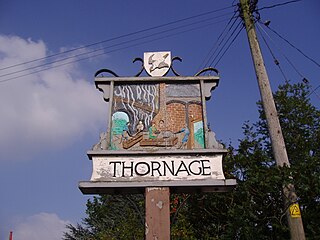The year 1725 in science and technology involved some significant events.

Sir John Pringle, 1st Baronet, PRS was a British physician who has been called the "father of military medicine".

Sir Richard Blackmore, English poet and physician, is remembered primarily as the object of satire and as a dull poet, but he was also a respected medical doctor and theologian.

Sir Samuel Garth FRS was an English physician and poet.
John Friend may refer to:

John Woodward was an English naturalist, antiquarian and geologist, and founder by bequest of the Woodwardian Professorship of Geology at Cambridge University. Though a leading supporter of the importance of observation and experiment in what we now call science, few of his theories have survived.

Thornage is a village and a civil parish in the English county of Norfolk. The village is 2.7 miles south-west of Holt, 23.2 miles north-west of Norwich and 11.3 miles east of Fakenham, and straddles the B1110 road between Holt and Guist. The nearest railway station is at Sheringham for the Bittern Line which runs between Sheringham, Cromer and Norwich. The nearest airport is at Norwich International Airport.
Events from the year 1728 in Ireland.

Dr. Henry Levett (1668–1725) was an early English physician who wrote a pioneering tract on the treatment of smallpox and served as chief physician at London Charterhouse.
The Harveian Oration is a yearly lecture held at the Royal College of Physicians of London. It was instituted in 1656 by William Harvey, discoverer of the systemic circulation. Harvey made financial provision for the college to hold an annual feast on St. Luke's Day at which an oration would be delivered in Latin to praise the college's benefactors and to exhort the Fellows and Members of this college to search and study out the secrets of nature by way of experiment. Until 1865, the Oration was given in Latin, as Harvey had specified, and known as the Oratio anniversaria; but it was thereafter spoken in English. Many of the lectures were published in book form.
William Freind (c.1715–1766) was an 18th-century Church of England clergyman who was Dean of Canterbury from 1760 to 1766.

[[File:Theatrum Chemicum Britannicum.jpg|thumb|{{largethumb|Theatrum Chemicum Britannicum]] Theatrum Chemicum Britannicum first published in 1652, is an extensively annotated compilation of English alchemical literature selected by Elias Ashmole. The book preserved and made available many works that had previously existed only in privately held manuscripts. It features the alchemical verse of people such as Thomas Norton, George Ripley, Geoffrey Chaucer, John Gower, John Lydgate, John Dastin, Abraham Andrews and William Backhouse.
Sir John Friend or Freind, was an English conspirator.
Freind is a surname, and may refer to:
Robert Freind (1667–1751) was an English clergyman and headmaster of Westminster School.
Edward Milward (1712?–1757) was an English physician and historian of medicine.
John Parsons was an English physician.

William Cockburn M.D. (1669–1739) was a Scottish physician, known for his dysentery remedy and as Jonathan Swift's doctor.
This page is based on this
Wikipedia article Text is available under the
CC BY-SA 4.0 license; additional terms may apply.
Images, videos and audio are available under their respective licenses.








